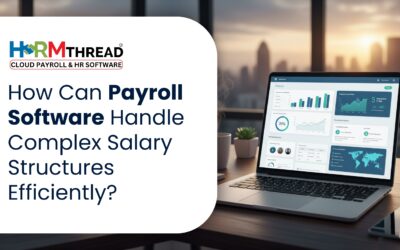Payroll software is essential for remote and hybrid teams, streamlining payroll processes while ensuring accuracy and compliance across diverse locations. Employees working in different locations across different time zones and often under different labor laws require the use of the payroll software in the processing of allowances, taxes, and formation, minimizing the possibility of calculation mistakes and saving time. It offers employment access to employers and employees with full disclosure of salaries and other employee remunerations. Furthermore, it also encompasses an inherent feature of integrating with time tracking as well as the HR systems, making the best payroll software a complete solution for managing distributed employees. Payroll software investment enables increased production, strengthens employee trust, and provides timely remuneration.
Why Is Payroll Software Key for Hybrid Teams Across Locations?
Managing hybrid teams across locations requires a streamlined approach to payroll, and HR and payroll software in India is key to achieving this efficiency. Since employees operate in different locations or have different working hours, processing payroll quickly becomes cumbersome if not supported by the necessary systems. Current payroll technology is designed to handle activities such as the computation or processing of salaries, tax remittances, and the provision of other employee benefits and allowances without delays and inefficiency. In India, for businesses that can have several subsidiaries and many employees spread across the country, such software fulfills compliance requirements such as TDS, PF, and features specific to regional tax laws, which are vital if you have to maintain a dispersed workforce.
Moreover, HR and payroll software in India integrates seamlessly with time-tracking and employee management systems, providing a holistic solution for hybrid teams. Some of these enable the administration of all data in one place where HR managers can track the attendance, leave demands, and performance indicators at the same time. Although the payroll information filed through the cloud storage can only be accessed in a secure manner, both employers and employees can access any required payroll information at will, thus building trust in the process. In so doing, some of the benefits that accrue to firms include the following: In addition, they increase satisfaction among staff in the overall Nairobi firms that are using advanced payroll software, especially when supporting their hybrid teams.
How Does Payroll Software Simplify Payments for Remote Teams?
Managing payroll for remote employees is made easy with the help of payroll software, which helps provide automated solutions for even the most complex payroll processing. When it comes to remote teams, it can be challenging to collectively address payments coordination related to time differences, tax laws, and methods of payment. A payroll software distributes the wages on time and determines and processes the taxes and deductions with little or no human interjection. Further, candidate data can be kept in one place, and he or she can keep tabs on the payment information, hours worked, as well as benefits, and ensure a smooth and efficient payroll.
Payroll software for small businesses is particularly beneficial in reducing administrative burdens while maintaining compliance. Many of these tools are developed for organizations with small budget constraints; thus, they are effective ways of managing the payroll process. They help small business owners to concentrate on business development while at the same time guaranteeing that their remote staff members are paid adequately and right on time. Conveyors such as payslip generation, direct credit, and integration with accounting packages are tools that payroll software cannot be moderated by organizations with a remote workforce.
How Does Payroll Software Ensure Security for Hybrid Teams?
Payroll software guarantees high-level protection for the employees of the hybrid teams due to applying the range of the security levels, such as the encryption of the wanted data and multi-factor authentication. Since the hybrid teams work in different locations, chances of privacy leaks are high, so the security of payroll systems matters. Today’s payroll solutions include encrypted servers for various numerical entries like salary, tax, and bank account numbers, thus the data can only be accessed by authorized personnel. Also, with data being collected in real time and also alerts being provided when certain activities could be posing threats, an organization is well protected from security threats targeting employee or company information.
For hybrid teams, payroll software also ensures secure access by leveraging cloud-based systems with role-based permissions. This makes it easy for HR managers and employees to access payroll information at any time from anywhere while promoting security. Further, the usual updates for software, along with adopting the neighboring standards, such as GDPR or the IT Act in India, strengthen the security protocols. Such features, when incorporated into the payroll software, create that much-needed sense of security for hybrid teams while they concentrate more on productivity.
Frequently Asked Questions
Q.1 What are the key features of payroll software designed for hybrid work environments?
A. Payroll software for hybrid work environments offers automated tax calculations, direct deposits, compliance tracking, time-tracking integration, cloud access, data encryption, multi-location support, and role-based permissions.
Q.2 What cost benefits can businesses expect from implementing cloud payroll solutions?
A. Businesses can reduce administrative expenses, eliminate manual errors, and streamline processes with cloud payroll solutions, saving costs on infrastructure, staffing, and compliance management.



